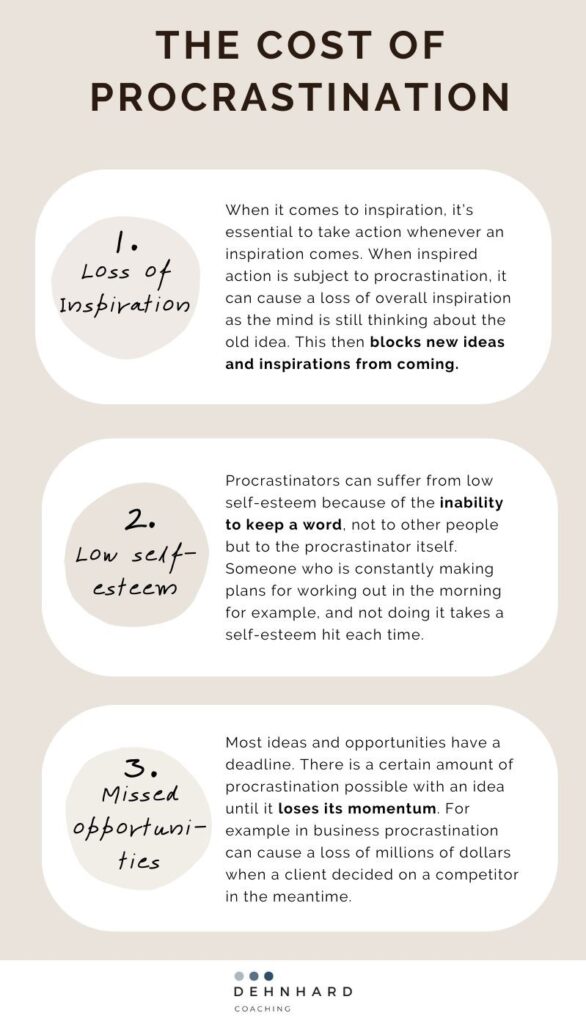There are countless articles out there on how to overcome procrastination but only a few of them seem to cover more than everyday tips and tricks. Why is that a problem? Because easy tips and tricks usually don’t work in the long run and sooner or later the procrastinator is back in his/her old patterns. Does that sound familiar? Then read one.
What if procrastination is not real and in reality is a symptom of a more fundamental issue? And looking at the fundamental issue that causes procrastination solves all the issues around battling with deadlines, organizing tasks, and building new habits to get things done on time once and for all. After resolving the underlying issue, procrastinators can experience getting things done long before a deadline, feeling excited and motivated for their work as well as getting the results they want.
This article shines a light on how personality, perfectionism, self-doubt, and self-sabotage influence procrastination and offers practical solutions to resolve these fundamental issues that cause procrastination.
Procrastination in a nutshell
Procrastination is the action of unnecessarily delaying or postponing something despite potential negative consequences. According to Joseph Ferrari, a professor of psychology at DePaul University, around 20% of U.S. adults are chronic procrastinators*. For some people, it’s the procrastination to do the laundry and for others, it’s the big business idea they are implementing. And while the laundry can pile up and be annoying, the business idea can be a real pain when thinking of the missed wealth, opportunities, and growth.
The cost of procrastination
A famous saying by Mark Twain goes
Twenty years from now you will be more disappointed by the things that you didn’t by the once that you did do.
which leads us to the price that procrastinators pay illustrated in the graphic below.

How personality influences procrastination
Not everyone is born a natural planner. For some people, it is easier to get things done on time while for others it is a constant struggle. One reason is the difference in personality. To understand this better, the MBTI can be a good help. The MBTI, or Myers-Briggs Type Indicator, is a popular personality assessment tool developed by Katharine Cook Briggs and her daughter Isabel Briggs Myers. It is based on the personality theories proposed by Swiss psychiatrist Carl Jung. The MBTI categorizes individuals into one of 16 different personality types based on their preferences in four key areas. According to the MBTI, there are two types of people when it comes to executing tasks: P and J. J’s are natural planners. They are organized, prepared and have an easy time sticking to plans. P’s on the other hand like to keep their options open and make decisions on the fly.
Taking these two it becomes apparent that both can fall for procrastination easily. The J types can make all kinds of plans but when it comes to executing, they procrastinate. The P’s on the other hand may procrastinate on deciding the first place. In general P types tend to finish things last minute which makes them a little more prone to procrastination.
Perfectionism and procrastination
Perfectionism is characterized by the refusal to accept any standard short of perfection and is very common in people who procrastinate. Perfectionists usually have a very high expectations of the outcome they want to produce. The problem is that this can cause them to either not start their work or to not finish it because nothing they ever do is matching up to their expectation. Or if it does it takes a lot of work and time. Procrastination usually kicks in when the mental picture is so big that it seems overwhelming and discouraging.
The combination of perfectionism and procrastination is tricky. For that reason, here are a few tips on how to overcome procrastination when it is linked with procrastination:
Tips to overcome perfectionistic procrastination
- Set a deadline
Set a deadline for what you are working on and leave the work untouched after. That way you avoid spending hours upon hours perfecting 5% of the actual work. - Start small
Start with a small step and work your way from there. Follow the easy road first, get the outline of the work and leave the details for later. - Progress every day
Take action every day. No matter if it is 5 or 50 minutes, make sure to stay in the flow of action. - Practice mindfulness
Be present with the panic that arises when you believe that something is not perfect. What emotions are coming up? Remember to take a step back and remember that you feel the emotion but you are not it. - Uncover hidden beliefs
Often perfectionists have a deeply rooted belief that they are not worthy or that they are imperfect. This makes it so that they constantly strive to bring perfection to the outside so that they can feel worthy.
This deeply rooted belief is at the core probably hard to resolve entirely as it is a fundamental assumption that like spider webs influence your entire life.
A new mindset for perfectionism
In his book “the creative act: a way of Being” Rick Rubin describes that the goal of art is not perfection but to share who we are and how we see the world. And imperfection makes art more relatable because deep down people can connect to it deeply as they are all imperfect. So your work, no matter how hard you try, will never be perfect. And if it would be, people could not relate and connect to it. So perfectionism is not even possible but also not useful.
How to overcome procrastination: Look at (Self-)doubt
Why would someone procrastinate on something which they know for sure will bring the desired outcome? This question leads to the next aspect that lies underneath procrastination which is doubt. A person can have many great ideas but if they doubt that they will ever harvest the fruits of their labor or that they are capable of doing the work, procrastination can be expected. In that case, it functions like an avoidance mechanism to not face disappointment or powerlessness.
In the case of self-doubt, it can extremely hard sometimes to use schedules and accountability to get something done. For that reason, addressing the underlying doubt can help overcome procrastination.
Here are some questions to take the first step to overcoming doubt when procrastinating:
- What am I doubting to achieve?
- What capabilities do I miss to get x done?
- How would I approach my work if I know for a fact that it will bring success?
- How would I approach my work if I view it as an experiment?
- Who would I be without these doubts?
Answering these questions can shine a light on what is causing the procrastination and can make it easier to feel empowered and motivated.
Self-sabotage: the enemy within
Self-sabotage is the act of doing or not doing things that block a person’s success. Procrastination can often be a way a person sabotages him or herself. For example, a woman might know that working out is better for her health and will help her lose weight but constantly puts it off. She may say things like “Today was such a stressful day at work” or “I will start tomorrow” “How to overcoming procrastination?”. From the outside, it may seem like she is just procrastinating when fact she can also be sabotaging herself. How can you know? Look at the hidden benefit of staying where she is. What is she getting out of struggling with her weight for example?
When self-sabotage happens
Self-sabotage often occurs when not all aspects of a person are aligned with a goal and a need is met by staying the way someone is. In the case of the woman above she maybe wants to be accepted and loved for her personality and not her body. Or an aspect of her wants to be lazy all day.
To understand this even deeper take the example of a man who is in a job and procrastinating on a big task that could get him a promotion. Deep down he fears the change of actually getting promoted because he fears the pressure this promotion comes with and rather prefers to not attract attention. Consciously he says that he wants the promotion but he acts in a self-sabotaging way because he currently gets the need met of staying more in the background.
With these examples, consider the following ideas:
Self-sabotage does not exist
Everything people do they do for a reason and to meet a certain need. So what seems to be sabotaging is beneficial for some part or on some level. Everyone who is not changing is getting something out of not changing. Their current situation is better than what they imagine the future will be.
How to overcome procrastination: Steps for Self-Sabotage
Now the question arises, what to do about this? The first step is understanding the hidden motivation for staying stuck and procrastinating by asking the following questions:
- What bad consequences do I avoid by not doing x?
- What do I get from procrastinating? How do I stay safe?
- What if tomorrow I wake up and do everything I tell myself I do? What do I imagine might happen as a result of that?
Procrastination- the mind’s desire to rest?
Robert Greene had an interesting perspective on procrastination. He mentioned that he is a procrastinator and learned to accept it. Often when he was procrastinating, he realized that it is his mind wanting to relax. Maybe what he was working on and the idea was not fully developed and he needed some extra input or mental space. This idea only applies though if one already has certain working habits in place. If procrastinators chronically procrastinate and are not getting even some things done, it’s not just the desire to relax.
Not all procrastination needs to be investigated deeper. At one point there just needs to be a little push towards doing something. For that reason, below are some procrastination tips.
How to overcome procrastination: 4 Tips

After looking at procrastination from another angle, the starting question of “What if procrastination does not exist?” can be raised again. Often what people call procrastination can be a symptom of the issues above but all so often it can just be something to work through and apply the tips and tricks. But one only knows for sure when they went on the path of looking further than what meets the eye.
*American Psychological Association. The Psychology of Procrastination: Why People Put Off Important Tasks Until the Last Minute. 2010.







